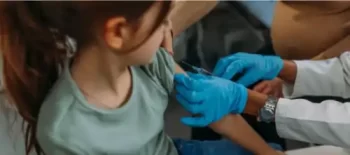
The Department of Health (DOH) is set to launch its ambitious human papillomavirus (HPV) vaccination program for young girls in 2025, following the approval of the program’s budget by President Ferdinand Marcos Jr. This initiative marks a significant step in combating cervical cancer, a disease that continues to pose a serious threat to women’s health in the Philippines.
🌟 A Milestone in Women’s Health
Health Secretary Teodoro Herbosa shared the details of the initiative during the Bagong Pilipinas Ngayon briefing, emphasizing the importance of HPV vaccination.
“What I asked of the President—and he granted—was to allocate the budget for the human papillomavirus (HPV) vaccination for all girls; it’s very important because the HPV vaccination is expensive, P4,000 per dose, two doses are needed, P8,000 per nine-year-old girl,” Herbosa explained in Filipino.
This move aligns with the global goal to reduce cervical cancer rates, especially in developing nations where access to preventive healthcare remains a challenge.
📊 Why HPV Vaccination Matters
Cervical cancer remains a pressing concern in the Philippines. Here’s a closer look at the statistics:
- Annual Cases: Approximately 7,897 Filipinas are diagnosed with cervical cancer each year.
- Mortality Rate: Of these, 4,052 women lose their lives to the disease annually.
- Cancer Ranking: Cervical cancer is the second most common cancer among women aged 15 to 44 in the country.
HPV and Cervical Cancer Prevention
The HPV vaccine is a proven shield against most types of cervical cancer, which is primarily caused by persistent infection with high-risk HPV strains. Administering the vaccine to young girls before they are exposed to the virus is critical for effective prevention.
💰 The Budget and Financial Details
Securing funding for the program was no small feat, given the high cost of the vaccine. The HPV vaccine costs approximately P4,000 per dose, with each girl requiring two doses, totaling P8,000 per child. With the President’s approval, billions of pesos will now be directed toward this lifesaving initiative.
“That’s also billions, but I’m glad the President gave that,” Herbosa remarked, highlighting the administration’s commitment to public health.
🌍 Building a Healthier Future for Filipinas
The nationwide rollout of HPV vaccination is expected to have far-reaching benefits, including:
- Reduced Cervical Cancer Incidence: Vaccination significantly lowers the risk of developing cervical cancer later in life.
- Financial Relief for Families: By providing the vaccine free of charge, the program alleviates the financial burden on families who might otherwise struggle to afford it.
- Improved Public Health Awareness: This initiative will likely encourage broader discussions around reproductive health and cancer prevention.
🛠️ Key Strategies for Success
To ensure the success of this program, the government and healthcare stakeholders must address several critical areas:
1. Public Awareness Campaigns
Educating parents, teachers, and communities about the importance of HPV vaccination will play a pivotal role in achieving high coverage rates.
2. Efficient Distribution
Setting up vaccination clinics in schools and rural health units will ensure accessibility, particularly in underserved areas.
3. Monitoring and Evaluation
Tracking vaccine coverage and effectiveness will provide valuable insights for improving future immunization programs.

Advertisement
FAQs: Understanding the HPV Vaccination Program
What is the HPV vaccine?
The HPV vaccine protects against the human papillomavirus, a major cause of cervical cancer. It is most effective when administered to girls aged 9–14 before they become sexually active.
Is the vaccine safe?
Yes, the HPV vaccine is extensively tested and proven safe by global health organizations, including the World Health Organization (WHO).
Who will receive the vaccine?
The program will prioritize girls aged 9 years old across the Philippines, with plans to expand coverage in subsequent years.
Disclaimer: The information provided in this article is for educational and informational purposes only. It is not a substitute for professional medical advice, diagnosis, or treatment. Always consult a qualified healthcare provider for personalized guidance and recommendations.








